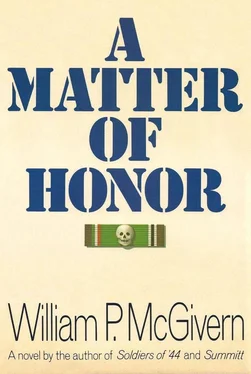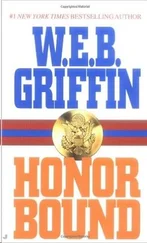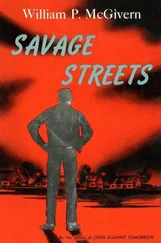“I still think you tried to kill me,” Lasari said, his stiff lips barely forming words. He lifted an arm and winced. “I think you cracked my rib cage.”
General Weir left the window. He took Lenox Riley’s .38 special from his inner tunic and put it on the table. “If I wanted to kill you, soldier, I wouldn’t have to do it the hard way.”
He passed the mug of tea to Lasari and closed the man’s chilled fingers around it. Lasari tried to sip but the cup chattered against his teeth. Weir took it from him, set it back on the table.
“We are not under surveillance here, there are no hidden microphones,” Weir said evenly. “I want answers. Let me repeat what I told you in Philo Park. My son, Lieutenant Mark Weir, was shot and killed in Chicago about two weeks ago. He was shot because he knew something, but probably didn’t know enough. A young woman calls my home and leaves an urgent message on my phone tape. She wants to talk to Mark about ‘George Jackson, that soldier.’ ”
“I told you back in the park,” Lasari said. “I’m a buck-ass private in the U.S. Army on assignment in Germany. I’ve got papers and orders...”
“Spare me that spiel,” Weir said. “Within hours of that phone call my son is ambushed and executed, Miss Caidin is beaten bloody on the way to the hospital and within another forty-eight hours Private George ‘No Middle Initial’ Jackson, a new ID in Army records, gets rush orders to join the Lucky Thirteenth in Colorado and leave almost immediately for Germany.”
Lasari reached for the mug of tea and took several hasty swallows. “... Miss Caidin is beaten bloody.” A rush of anger had surged through his body, leaving his mouth burning, his tongue parched and dry.
“You’re involved in something you shouldn’t be involved in,” the general said. “You know that, I know that. You can save us both a lot of further pain and trouble by telling the truth.”
“I don’t know who killed your son, I don’t know what’s going on in Chicago.”
“Maybe this will clear your thinking,” Weir said. “My son was working on a case involving four American soldiers. His jurisdiction was Chicago, but he suspected the key was in Europe. All four of those men were, as you put it, buck-ass privates in the U.S. Army doing their duty on assignment in Germany. They all had papers, they all had orders. And they all had one more thing in common. They were murdered in Chicago right after getting back from Germany...”
“I can’t help you,” Lasari said, but suddenly other words were sparking like electric shocks through the haze of confusion and sedation. Strasser, in his vindictive drunkenness, had said too much, had almost spelled it out. “ ‘... the next friendly face you, Jackson, will see will be at O’Hare Airport in Chicago. Just one more GI on leave. You’ll be met by friends.’ And Eddie Neal with his farewell message ‘... unfinished business between you and me... Yeah, Jackson, we still got some things to settle.’ ”
The general picked up the passport and flipped it open to Lasari’s new picture. “A new passport, soldier? Where did you think you were going? What name were you going to put in this one, George Jackson or Durham Lasari?” He waited for an answer, then said, “What name were you going to desert under this time? That’s the long and short of it, isn’t it? Even with trumped-up papers, you were going to betray your uniform again. You did plan to desert a second time, didn’t you, Lasari?”
“You live in a tidier world than I do, general. You’re talking about the Articles of War, I’m talking about survival. I’m facing the federal pen, or worse. I hadn’t decided how to save myself.”
The wind seemed to be circling the house, rattling shutters, sending a whistling draft down the chimney and stirring the fir branches that touched the roof. For a moment both men stopped to listen. Then Lasari broke the silence. “We had a motto in ’Nam, general, something you wouldn’t understand. It applies only to the men who take orders, never to the men who give them. ‘It don’t mean nothing. ’ that was our motto, our fingerhold on sanity. Sure, I’m a deserter, but I wanted to make good on that desertion. I wanted clean paper. I was working with Miss Caidin in Chicago and got double-crossed by the Army itself.”
“Exactly what does that mean, soldier?”
“There’s nothing more I want to say. You think I’m scum, a yellow belly, a man who’d betray his uniform. Okay. What about your desertion, general? Bonnie Caidin told me you retired because you couldn’t explain yourself or your wars to your son. What made you crack, general? Where the hell was your sense of responsibility to the Army? You took the good paper, the privileges, the pension and walked away. I just walked away with nothing in my hands but crutches. You’re talking to me about loyalty and patriotism, I think you’re trying to talk to a dead man. I’m not your son, general.”
The general picked up the gun and walked to the windows. He cracked open the shutters and studied the darkness outside. Then he went to the front door, opened it and stood in silence. There were winds and the sounds of a stormy mountain night but nothing more. He closed the door and came back to stand opposite Lasari.
Scotty Weir pulled the receiver of the automatic back and released it to slam a round into the chamber, then pointed the gun at Lasari. “Whatever it is you’re afraid of,” he said, “I want you to be more afraid of me, soldier. Hear me good. You’re a two-time deserter, and I wear four silver stars. If I decide to pull this trigger, we won’t disturb anything more than a couple of snow owls.”
“I’ve got nothing to tell you,” Lasari said.
The general turned suddenly, pulled the duffel bag off the couch and tossed it at Lasari’s feet. “You can tell me about that duffel, why it’s so important to you.”
“It isn’t,” Lasari said. “There’s nothing in it but some GI gear and a couple of presents I wanted to bring back to the States.”
“Not good enough,” Scotty Weir said and pulled back one cuff of his shirt and tunic. Lasari saw the broad, strong hand, a glint of a silver ID bracelet, then the swollen flesh of the wrist, clawed with long scratches and scarred by tooth marks. “When I put the gauze over your face, you fought like a bull terrier to keep that bag...”
“I didn’t know what I was doing,” Lasari said.
“I think you do,” the General said. He took out a pocket knife, flicked open the blade and reached down to slash the canvas side of the bag. “Let’s see what you’re carrying, soldier.”
“No! Don’t do that! It’s my only way out!” Lasari stood, still groggy, and took a wild, looping swing at Weir. Weir backhanded his almost casually along the side of the head with the revolver, sending him slumping back into the chair.
He looked at his watch. “We’ve got time, Lasari, if you start talking pronto. And we’re not going anywhere until you do.”
“Against my will I’m part of a drug loop,” Lasari said at last. “I believe if I could complete the loop, there’s a chance to indict the people involved, do myself and the world a favor. But it’s a tough gamble. I’m convinced I’ll be killed and/or sent to prison along the way. Back there at maneuvers, I was trying to make up my mind how to figure my odds.”
“Let me help you,” Tarbert Weir said.
Lasari started with the first night at the Veterans’ Bureau and told the general what had happened since then, from Sergeant Malleck to the armory, through Sergeant Strasser and Pytor Vayetch, the false illness, and the military papers already cut for transport back to Chicago.
Читать дальше












